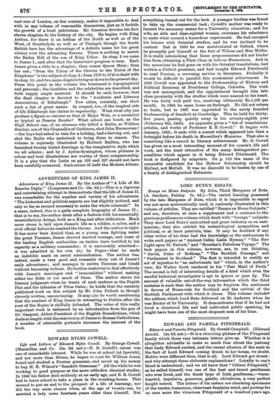Life and Letters of Edward Byies Cowell. By George Cowell.
(Macmillan and Co. 12s. 6c1.. net.)—E. B. Cowell's career was one of remarkable interest. While he was at school (at Ipswich), and not more than fifteen, he began to read Sir William Jones, found and studied a Persian grammar, and saved up his money to buy H. R. Wilson's" Sanskrit Grammar." All the while he was working to good purpose at the more orthodox classical studies. In 1842 his father died suddenly at an early age, and E. B. Cowell had to leave school to take a place in the counting-house. This seemed to put an end to the prospect of a life of learning; nor did the way seem clearer when, at the age of twenty-one, he married a lady some fourteen years older than himself. But everything turned out for the best. A younger brother was found to take up the commercial task ; Cowell's mother was ready to furnish the necessary means for a University education ; and his wife, an able and clear-sighted woman, overcame his reluctance to make what seemed a hazardous experiment. He had occupied his leisure with Oriental studies, and he was inclined to be content. But in 1850 he was matriculated at Oxford, where he promptly put himself at the feet of Wilson and Max Muller. It is really astonishing that these prepossessions did not hinder him from obtaining a First Class in Literae Humaniores. And in the meantime he had gone on with his Oriental translations, had written a Pi4krit grammar, and had taught Edward FitzGerald to read Persian, a crowning service to literature. Probably it would be difficult to parallel this academical achievement. In 1856 Cowell was appointed to the Professorship of History and Political Economy at Presidency College, Calcutta. The work was not uncongenial, and the appointment brought him into close proximity with the studies which were nearest to his heart. He was fairly well paid too, receiving ultimately Rs.1,100 per month. In 1864 he came home on furlough. He did not return to India, but in 1867 was appointed to the newly founded Professorship of Sanskrit at Cambridge. This he held for thirty. five years, passing quietly away in his seventy-eighth year (February 9th, 1903). An appendix gives a "list of translations articles, and works of Professor E. B. Cowell." It begins with January, 1862; it ends with a sonnet which appeared less than a fortnight before his death in Macmillan's Magazine. That also is something like a record in literary achievement. Mr. G. Cowell has given us a most interesting account of his cousin's life and work, not the least attractive of the many distinguished per- sonalities which appear in it being Edward FitzGerald. The book is disfigured by misprints. On p. 110 the name of the successful candidate for the Hebrew Scholarship should be McCaul, not McCall. It was no discredit to be beaten by one of a family of distinguished Hebraists.
LORD BUTE'S ESSAYS.






































































 Previous page
Previous page